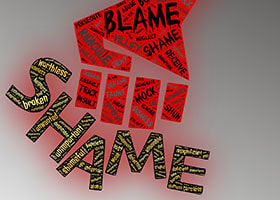|
By Sybil Cummin, MA, LPC, ACS  Domestic violence (DV) is one of the silent epidemics in our culture today. It is not well understood by the larger system that these couples will come into contact, let alone understood by the public and those who have not experienced DV. And even when you have experienced DV in a relationship, if you do not have the resources and support to understand what has happened to you, you can be left completely confused or believing what your abusive partner has spewed as truth. When 1 in 4 women and 1 in 9 men have experienced severe forms of physical violence in an intimate relationship(1), why is it not better understood? One of the misconceptions or myths that is consistently used to defend abusive behaviors is that abusive partners “just have an anger problem.” If an abusive act is witnessed by others or called out in any fashion, the excuse that they have a problem controlling their anger is a go-to response. And, this excuse is routinely believed to be the cause of the behaviors. This makes sense to those who have witnessed a single abusive act or those in the system that do not have enough knowledge on the history of the coercive control that has been used throughout the length of the relationship. It is even an acceptable excuse for many victims feeling the wrath of this so-called anger problem. So, can DV just be explained as poor impulse control or difficulties controlling anger?
0 Comments
By Sybil Cummin, MA, LPC, ACS  When you hear the term domestic violence, what first comes to mind? Black eyes and split lips? Who do you picture? A woman in a low-income neighborhood or trailer park with bleached hair, cut-off shorts with a cigarette hanging out of her mouth? What about the abuser? What kind of monster do you depict? Does anything change when you hear the term intimate partner violence? There are many different definitions of domestic violence (also known as intimate partner violence). There are different legal definitions depending on what state you live in. You can find the definition for your state here. A little more similar are the therapeutic definitions used by mental health professionals and advocates. I have combined several different definitions found in the literature to create yet another one. One that, I believe, encompasses a majority of the aspects and nuances of domestic violence. Domestic Violence (also known as Intimate Partner Violence) is a systematic and willful pattern of power and control perpetrated by one intimate partner against another and includes, but is not limited to, intimidation, physical assault, sexual assault, psychological and/or emotional abuse, and economic coercion. By Sybil Cummin, MA, LPC, ACS  Victims and survivors of intimate partner violence (IPV) are questioned and discredited by those that are supposed to help keep them safe. Here are some statements made by victims and survivors of IPV that they would like therapists and other professionals to know before working with this population. “Abusers make sure they seem like good people so that if their victims speak up not one will believe it” -K By Sybil Cummin, MA, LPC, ACS (If you are in an unsafe relationship, please take caution in where you keep this article or any of the activities completed based on this article. Please reach out to your local advocacy center if you need help with safety).  There are many beliefs about the power of forgiveness and the necessity to do so if you want to heal. You might receive the advice that if you do not forgive your abuser, then it will forever eat you up inside. The thought of forgiving the person that tore you down, gave you bruises, made you doubt your own reality, threatened to take away your children (or maybe even succeeded) and did so willfully is sickening to you. If you are still experiencing forms of abuse even after separation, how do you forgive someone of past hurts, when they are not in the past at all? The abuse is current. So, is forgiveness of your abuser a mandatory part of healing? In my work with victims and survivors of Intimate Partner Violence (IPV) and survivors of sexual abuse, forgiveness as it is typically defined does not seem to be a necessary step of the healing process. There are two processes on your healing journey that relate to forgiveness that are truly helpful, and for the clients I have worked with an integral part of the healing process. The first is an understanding of the abuse and your abuser. Second, and probably holds the most power in your healing journey, is forgiveness of yourself. By Sybil Cummin, MA, LPC (If you are in an unsafe relationship, please take caution in where you keep this article or any of the activities completed based on this article. Please reach out to your local advocacy center if you need help with safety).  Do you find yourself feeling guilty for everything in your relationship? Does everything feel like it is your fault or are you made to believe all your relationship problems are your fault? This tactic is a very common one with in abusive relationships and is one that can keep you hooked into staying for a long time. How can you determine if the fault and responsibility for the problems in your relationship are yours to carry and how can you discard these feelings to gain a true perspective on your relationship? Are you really feeling guilt or is it something different all together? I think that it is important to look at what the term “guilt” truly means and how it can be helpful or harmful to our self-worth and mental health. Guilt can be identified as a feeling when we have done something that goes against our values or when we have done something “wrong.” By Sybil Cummin, MA, LPC (If you are in an unsafe relationship, please take caution in where you keep this article or any of the activities completed based on this article. Please reach out to your local advocacy center if you need help with safety).  You just started dating someone that seems too good to be true. You are waiting for the shoe to drop, but it hasn’t. Could this be the one? It is common for everyone to start picturing their future with someone they are dating when it is going well. The little house with the white picket fence, 2.5 kids, and a dog. The perfect life. It seems perfect, until it is not. Your perfect relationship and perfect partner has love bombed you. You are no longer treated like a queen and the center of your partner’s world. In fact you are treated worse than you can imagine. Whether you are physically abused, emotionally abused, sexually abused, financially abused or any of the other forms of abuse, the shock remains the same. How could this happen? You can still picture and maybe even feel the amazing start to your relationship. “No,” you tell yourself, “my partner can change,” or “we are just going through a rough patch.” You hold the image of your perfect life firmly in your mind. We can still achieve this if only… |
AuthorSybil Cummin, MA, LPC, ACS Archives
February 2021
Categories
All
|
